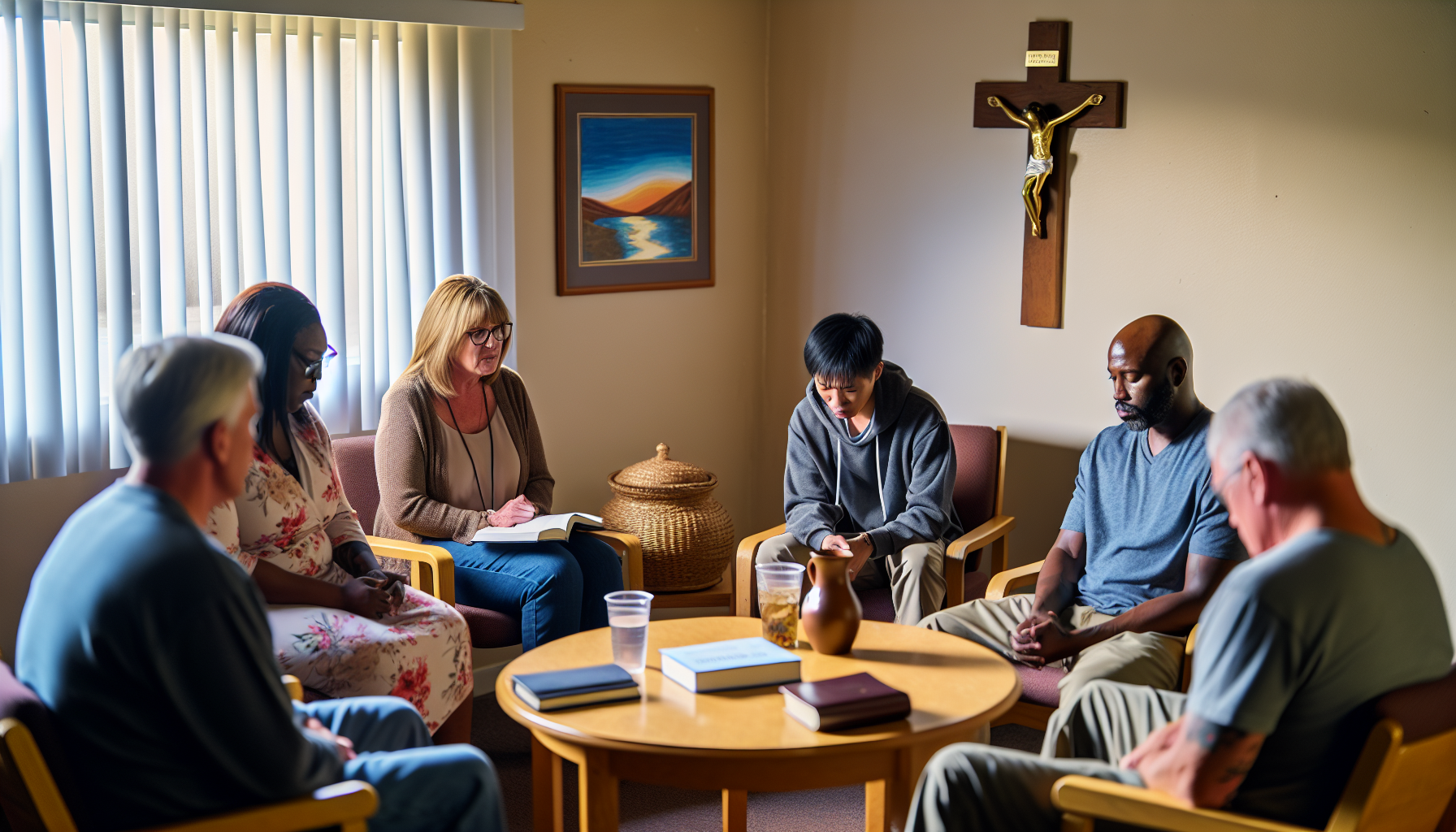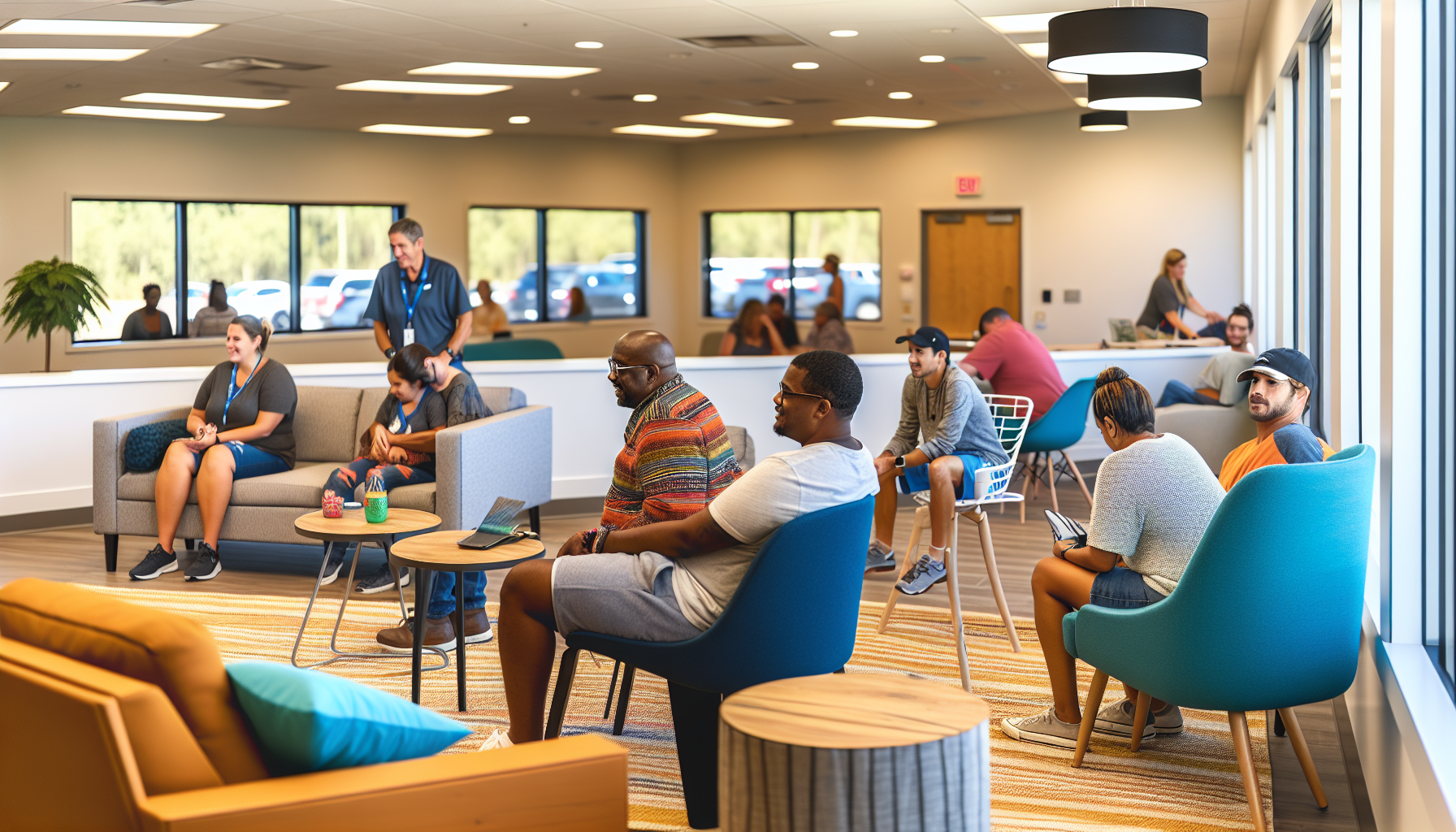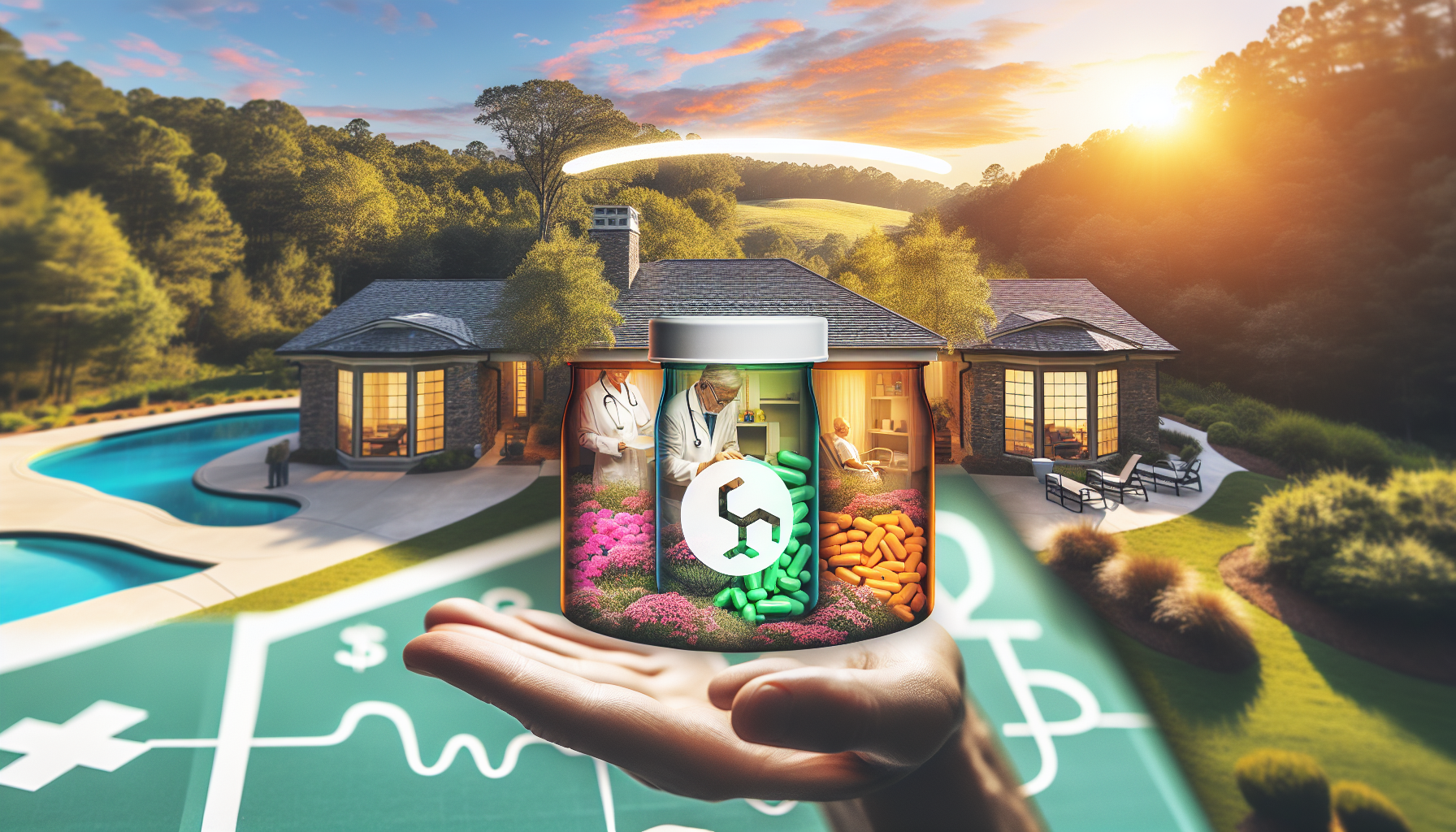Discovering the ideal alcohol rehab centers in South Carolina means finding a place that offers personalized care, evidence-based treatments, and supportive aftercare. With various options available, our guide focuses on those centers that stand out for their commitment to individualized recovery plans and their services’ success rates. Here, we’ll navigate the specifics of what makes these facilities the right choice in South Carolina and how they can best serve you or your loved one on the road to recovery.
Key Takeaways
- South Carolina offers a variety of alcohol rehab programs featuring personalized, evidence-based treatment, with options ranging from medication-assisted treatment and long-term inpatient care to faith-based and holistic approaches, catering to the unique needs of each individual.
- Rehab centers in South Carolina ensure access to different levels of care, such as inpatient and outpatient services, and address financial concerns through health insurance coverage and alternative payment solutions like Medicaid, sliding-scale fees, or free treatment options.
- Specialized services like medication-assisted treatment (MAT) and alternative therapies, along with comprehensive aftercare support and community resources, enhance the chances of successful long-term recovery from alcohol addiction.
Exploring Premier Alcohol Rehab Centers in South Carolina

South Carolina, known for its lush landscapes and historic charm, is also home to some of the nation’s leading alcohol rehab centers, havens of healing where individuals can embark on their recovery journey. These centers offer more than just addiction treatment services; they provide a sanctuary for comprehensive healing, addressing both substance dependencies and any accompanying mental health disorders. Here, the road to sobriety is paved with evidence-based addiction treatment, ensuring that every individual receives the care they need in their battle against alcohol addiction.
From the serene shores of Hilton Head Island to the historic quarters of Charleston, these rehab centers in South Carolina are beacons of hope for many. They recognize that each individual’s path to recovery is unique, employing an arsenal of medication-assisted treatments and specialized programs to manage withdrawal symptoms and reduce cravings. These facilities stand out not just in South Carolina but as leading examples nationwide, offering a blend of compassion, innovation, and comprehensive care to those seeking freedom from the grips of alcohol addiction.
Alcohol Rehab in South Carolina
Alcohol rehab in South Carolina offers a range of comprehensive programs tailored to individuals struggling with alcohol addiction. These programs typically encompass various therapeutic approaches, including cognitive-behavioral therapy, group counseling, and holistic treatments. With a focus on addressing the root causes of addiction, alcohol rehab centers in South Carolina strive to provide personalized care to each patient. The state’s rehab facilities often emphasize the importance of aftercare planning and ongoing support to ensure long-term sobriety. Whether seeking inpatient or outpatient treatment options, individuals in South Carolina can find the necessary resources and support to embark on the journey to recovery from alcohol addiction.
Hilton Head Island Recovery Oasis

Nestled amidst the tranquil beauty of Hilton Head Island is BriteLife Recovery, a sanctuary that epitomizes the concept of a full continuum of care for those grappling with drug or alcohol addiction. Here, the recovery journey transcends traditional methods, embracing a holistic approach that integrates the body, mind, and spirit into the healing process. With practices like yoga and meditation, this treatment facility offers a serene backdrop for individuals to find balance and peace as they navigate the complexities of addiction treatment.
Art therapy serves as a creative outlet at BriteLife Recovery, allowing individuals to express their emotions and experiences in a tangible form. This modality not only facilitates self-exploration but also fosters a deeper connection to the recovery process, making it a critical component of the center’s addiction treatment services.
The blend of innovative therapy and the natural serenity of the surroundings makes BriteLife Recovery an oasis for those seeking solace and strength on their path to sobriety.
Charleston Haven for Healing

The Charleston Recovery Center stands as a testament to the power of long-term commitment in the journey towards sobriety. Specializing in 90-to-360-day residential programs, this center provides a haven for men and women to immerse themselves in a supportive and intensive healing environment. Here, the focus is on inpatient services, offering a structured space where the tumult of the outside world fades away, allowing residents to concentrate solely on their recovery.
With programs that span several months, the Charleston Recovery Center ensures that individuals have the time and support necessary to delve deep into the root causes of their alcohol addiction. This long-term approach is designed to instill resilience and equip individuals with the tools they need for sustained sobriety, long after they leave the center’s doors. It’s a place where transformation isn’t just possible—it’s expected.
Faith-Based Sobriety Sanctuaries

For many, finding strength in faith is a vital component of the recovery process. Faith Home Christian Recovery offers a unique blend of faith-based, short-term inpatient drug rehab programs that integrate 12-step principles with Christian teachings. This approach provides a spiritual foundation for individuals seeking to rebuild their lives, creating a compassionate community where faith and recovery walk hand in hand.
Through devotional services and spiritual counseling, Faith Home Christian Recovery addresses the substance abuse issues of its residents with a reverence for their spiritual needs. The inclusion of faith-based practices in addiction treatment services offers a profound sense of hope and purpose, resonating with those who seek solace in their beliefs. It’s a sanctuary where the journey to sobriety is as much about spiritual renewal as it is about physical and mental recovery.
Personalized Treatment Programs Tailored to Individual Needs

In the realm of addiction treatment, one size does not fit all. Personalized treatment programs are the cornerstone of effective rehab, designed to align with the intricacies of an individual’s journey to sobriety. Utilizing predictive models and data from randomized trials, South Carolina’s treatment facilities are at the forefront of crafting treatment plans that consider the unique differences and baseline characteristics of each person. It’s a meticulous process that enhances the efficacy of treatment and ensures that each individual receives the most beneficial intervention strategy possible.
Personalized treatment programs in South Carolina are supported by dedicated medical staff and therapists who strive to meet the specific needs of each client. From outpatient behavioral health services that cater to various demographics, to holistic rehab programs that incorporate organic meals and meditation for mental and spiritual growth, the state’s rehab centers are committed to providing tailored care that addresses both substance abuse and the underlying factors contributing to addiction. The Mental Health Services Administration plays a crucial role in ensuring the quality and effectiveness of these programs.
Assessing Patient Needs
The journey to recovery begins with a comprehensive assessment, a critical step that helps clinicians understand the individual characteristics that impact treatment outcomes. From the groundbreaking insights of the MATCH study to the use of psychological assessments, South Carolina’s rehab centers are dedicated to identifying the most effective treatment strategies for each person. Factors such as comorbid psychiatric conditions, social and cognitive functioning, as well as individual motivation, are carefully considered to tailor a treatment plan that maximizes the chances of a successful recovery.
By employing standardized psychological assessments like the MCMI®IV and MMPI, clinicians can uncover the psychological underpinnings of a person’s substance use, shaping a personalized treatment plan that is both compassionate and clinically sound. The insights gained from these assessments are invaluable, guiding the recommendation of complementary treatments and aftercare strategies that resonate with the patient’s specific needs and life circumstances. It’s a process that embodies precision and personalization, ensuring that each step taken on the road to recovery is firmly rooted in understanding and empathy.
Customized Care Pathways
Once individual needs are assessed, the next step is to navigate the various levels of care available. From residential treatment to intensive outpatient programs, each level is tailored to the individual’s needs and anticipated response to treatment. In South Carolina, inpatient treatment offers a sanctuary for those requiring full-time care, while outpatient treatment provides a flexible option for those able to balance personal responsibilities with their recovery efforts. Facilities like Greenville Transitions Recovery Center exemplify this approach, focusing on rebuilding healthier habits through experiential treatments in their outpatient programs.
The customized care pathways available in South Carolina ensure that whether an individual requires the immersive experience of inpatient care or the adaptability of outpatient programs, their treatment plan is optimized for their unique situation. It’s a thoughtful balance between the rigorous demands of recovery and the realities of daily life, ensuring that each person has the opportunity to heal while maintaining the connections and responsibilities that enrich their lives.
Inpatient vs. Outpatient Treatment: Understanding Your Options
Navigating the options for addiction treatment can be overwhelming, but understanding the distinct benefits of inpatient versus outpatient treatment simplifies the decision-making process. Inpatient rehab in South Carolina offers a safe haven with 24-hour medical and emotional support, providing a structured environment that is conducive to recovery.
On the other hand, outpatient treatment affords flexibility, allowing individuals to continue their daily routines while receiving treatment for alcohol rehabilitation. These two primary modalities cater to different needs and lifestyles, ensuring that treatment is accessible and effective for all who seek it.
The Intensive Immersion of Inpatient Care
Inpatient care is often a beacon for those seeking an immersive and supportive recovery environment. With facilities like Morris Village in Columbia, individuals are afforded the luxury of focusing entirely on their recovery journey without the distractions of the outside world. The structure of inpatient treatment ensures that patients have access to:
- Medical professionals around the clock
- Therapeutic activities and support groups
- Individualized treatment plans
- Detoxification services
- Mental health services
This fosters a critically supportive environment that can significantly enhance the likelihood of successful detox and long-term sobriety.
The duration of inpatient care can vary, with programs ranging from 30 to 90 days, tailored to the severity of the individual’s addiction. This level of care is particularly beneficial for individuals with severe substance use disorders, as it provides the stability and community needed to navigate the challenges of recovery. Inpatient rehab is about creating a foundation upon which a sober life can be built, one day at a time.
Flexibility of Outpatient Programs
For those whose circumstances require a more flexible approach, outpatient programs in South Carolina offer a solution that harmonizes treatment with daily life. Facilities like Palmetto Addiction Recovery Center and Next Step Recovery provide step-down programs that allow individuals to transition smoothly from inpatient care to a less intensive outpatient setting. These programs, including those offered by CDAP, encompass a continuum of services that integrate recovery skills, education, and therapy into the structured yet adaptable model of outpatient care.
Outpatient programs, including the intensive outpatient program, provide the necessary support while empowering individuals to apply what they’ve learned in real-world situations. This approach to treatment, offered through a treatment program like an outpatient program, not only facilitates the maintenance of personal commitments and responsibilities but also ingrains relapse prevention into the fabric of everyday life. It’s a testament to the belief that recovery is not a separate journey but one that coexists with the rest of an individual’s life experiences.
Financial Considerations for Alcohol Rehab
Acknowledging the financial aspects of alcohol rehab is crucial, as it can be a determining factor in accessing treatment. Thankfully, in South Carolina, approximately three-quarters of alcohol rehab programs accept Medicaid or private health insurance, which can alleviate the financial burden for many seeking help. The extent of coverage varies depending on the policy and treatment needs, so it’s essential to understand the details of your insurance plan.
For those without insurance or Medicaid, exploring alternative payment solutions becomes a vital step in the journey toward recovery.
Navigating Health Insurance Coverage
Understanding how to navigate health insurance for rehab can be the difference between starting treatment or postponing it. With providers like BlueCross BlueShield of South Carolina, many individuals may find that their insurance covers a significant portion of the costs associated with rehab, including detoxification, inpatient or residential rehab, and medication-assisted treatment. The specific coverage details can be found within the terms of an individual’s insurance policy, making it imperative to review and understand the policy thoroughly.
For those who are unsure about the coverage provided by their insurance, resources are available to help identify rehab facilities that accept Medicaid and other forms of insurance. This information can be invaluable in finding a treatment center that aligns with both healthcare needs and financial capabilities, ensuring that the road to recovery is not hindered by financial obstacles.
Alternative Payment Solutions
For individuals without insurance, South Carolina offers a ray of hope with alternative payment solutions. Sliding-scale fees, low-budget, or even free treatment options are available, ensuring that financial barriers do not stand in the way of recovery. By utilizing resources that list affordable and free rehab centers, individuals can find services that fit their financial situation, providing a lifeline for those in need.
Treatment specialists play a vital role in helping individuals navigate these options, offering support in finding a rehab center that aligns with their financial capacity. The existence of these alternative payment solutions is a testament to South Carolina’s commitment to making addiction treatment accessible to all, regardless of their economic status.
Specialized Services Enhancing Recovery Success
Beyond the standard treatment modalities, South Carolina’s drug rehab centers offer specialized services that significantly enhance the success of recovery. These services range from medication-assisted treatment to holistic and alternative therapies, catering to the diverse needs of individuals on their road to sobriety at various treatment centers.
Facilities like Rebound Behavioral Health and Havenwood at Springbrook Behavioral Health integrate evidence-based treatments like dialectical behavior therapy with medication-assisted therapy, providing a comprehensive approach to addiction treatment.
Medication-Assisted Triumphs
Medication-assisted treatment (MAT), also known as Medications for Opioid Use Disorder (MOUD), plays a pivotal role in the management of withdrawal symptoms and reduction of cravings. This form of treatment has become recognized as an effective public health strategy, even as a standalone treatment without other forms of counseling. In South Carolina, centers like Recovery Centers of America at Greenville integrate MAT into their comprehensive treatment approach, offering a full spectrum of addiction treatment services that address both opiates and alcohol.
The use of FDA-approved medications such as methadone, buprenorphine, and naltrexone supports individuals in achieving and maintaining sobriety from drug and alcohol addiction. By mitigating the physical challenges of recovery, MAT allows individuals to focus on the psychological aspects of their addiction, fostering a more holistic approach to healing.
Who Can Prescribe Medication
“Who can prescribe medication” is a question often asked by individuals seeking medical treatment. In most jurisdictions, licensed medical doctors (MDs) and doctors of osteopathic medicine (DOs) are authorized to prescribe medication. These professionals undergo rigorous education and training to understand the complexities of various medications and their interactions with the human body. Additionally, nurse practitioners (NPs) and physician assistants (PAs) in many places have the authority to prescribe medication under the supervision of a licensed physician. Pharmacists also play a crucial role in the medication process, although they typically do not prescribe medication themselves; rather, they ensure the safe dispensing and usage of prescribed medications. Overall, the ability to prescribe medication is tightly regulated to ensure patient safety and the effective treatment of medical conditions.
Holistic and Alternative Therapies
The journey to recovery is not solely about addressing the physical dependencies of addiction but also about nurturing the mind and spirit. South Carolina’s holistic drug rehabilitation centers understand this, blending traditional and alternative treatments to offer a well-rounded approach to recovery. At facilities like Waypoint Recovery Center, patients can engage in:
- Equine-assisted therapy
- Art therapy
- Outdoor therapy
- Mindfulness meditation
These therapies serve to heal and strengthen the whole person.
Centers like Hammocks on the Edisto and Lantana Recovery exemplify the personalized and holistic treatment plans that are a hallmark of South Carolina’s approach to addiction treatment. By integrating holistic therapies with evidence-based treatment modalities, centers like BriteLife Recovery South Carolina and HopeWay provide an environment where comprehensive healing is not just a goal—it’s an expectation. It’s through these alternative therapies that patients can explore new avenues of self-discovery and develop the resilience needed for a sober life.
Support Beyond Rehab: Aftercare and Community Resources
Recovery from alcohol addiction doesn’t end with the completion of a rehab program. Aftercare and community resources play an essential role in supporting long-term recovery and preventing relapse. South Carolina’s rehab facilities understand this, providing comprehensive aftercare planning that includes employment guidance and a supportive environment to ensure a successful reintegration into society.
Sober living homes, community support groups, and ongoing therapy are just a few examples of the resources available to individuals after they leave the structured environment of rehab.
Lifelong Alumni Networks
Alumni programs are a vital component of aftercare, offering a lifelong support network that can make all the difference in maintaining sobriety. These programs in South Carolina enable individuals recovering from alcohol addiction to:
- Stay connected with peers from rehab
- Foster a community that supports and understands the challenges of post-treatment life
- Participate in various community-based activities
- Ease the transition from the structured treatment environment to the everyday challenges and routines
- Support sustained recovery
The level of involvement in alumni programs is often flexible, empowering individuals to tailor their engagement to best support their ongoing recovery needs. This flexibility ensures that the support network is robust yet adaptable, capable of providing the right level of support at the right time. It’s about creating a community that not only celebrates sobriety but also stands together in the face of life’s inevitable challenges.
Access to Local Resources
Sober living homes in South Carolina offer:
- A safe and structured environment that supports long-term sobriety
- Substance-free living space
- Supportive housemates
- Rules that help individuals maintain their recovery momentum
- Local peer support groups, such as 12-Step, Al-Anon, and Smart Recovery, that provide a network of peers who share experiences and coping strategies, reinforcing the individual’s commitment to sobriety.
Access to these local resources is crucial for individuals who have completed rehab, as they provide continuity of care and a community of support. By engaging with local resources, individuals in recovery can navigate the challenges of post-rehab life with confidence, knowing they have a network of support that can help them maintain their sobriety and thrive in their newfound life.
Summary
Embarking on the journey to recovery is a courageous step, and finding the right alcohol rehab center in South Carolina is pivotal to achieving long-term sobriety. From the serene Hilton Head Island Recovery Oasis to the faith-based sanctuaries, the state offers a diverse array of rehab centers that cater to individual needs with personalized treatment programs. Whether one seeks the immersive experience of inpatient care or the flexibility of outpatient programs, financial considerations, and specialized services, South Carolina’s rehab facilities are equipped to guide individuals toward a successful recovery. Remember, the journey doesn’t end with rehab; aftercare and community resources are essential to sustaining sobriety and embracing a life of wellness and purpose.
Frequently Asked Questions
Does health insurance cover the cost of alcohol rehab in South Carolina?
Yes, health insurance in South Carolina often covers the cost of alcohol rehab, including Medicaid and private insurance, but the extent of coverage varies based on individual policies and treatment needs. It’s essential to review your plan or consult with treatment specialists for guidance.
What types of treatment are available at alcohol rehab centers in South Carolina?
In South Carolina, alcohol rehab centers offer medication-assisted treatment, inpatient and outpatient programs, holistic therapies, and evidence-based psychotherapies to personalize treatment based on individual needs and recovery goals.
Can I continue working while attending an outpatient rehab program?
Yes, you can continue working while attending an outpatient rehab program as these programs are designed to allow individuals to maintain their daily responsibilities, including work, while attending scheduled treatment sessions. These programs offer flexibility with daytime or evening options to accommodate various schedules.
Are there any specialized programs for women in alcohol rehab centers in South Carolina?
Yes, there are gender-specific addiction treatment programs in South Carolina that cater to the unique challenges women face during substance abuse recovery. These programs consider factors such as dependency development rates and societal roles.
How do I find a rehab center in South Carolina that fits my financial situation?
You can find a rehab center in South Carolina that fits your financial situation by exploring sliding-scale fee options based on income, as well as low-budget or free treatment options. Treatment specialists can help guide you in selecting a center that aligns with your financial needs, ensuring access to necessary treatment services.
The post Navigating Your Recovery Journey: Top Alcohol Rehab Centers in South Carolina appeared first on Lantana Recovery: Addiction Treatment Rehab Center.
source
https://lantanarecovery.com/alcohol-rehab-centers-in-south-carolina/














